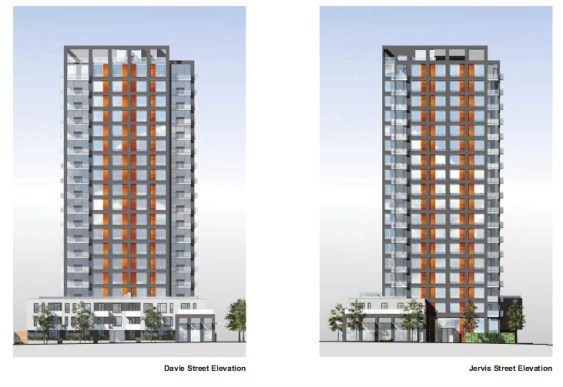Recent headlines brought to light an ugly compromise happening in Vancouver housing developments. Several developments looking to leverage the City’s offer to trade density for some affordable housing units have designed segregated entrances for the residents of the affordable housing units through a “poor door.”
Though the recent approval of a high rise at Jervis and Davie is the first I’ve heard of poor doors, it turns out several buildings in Vancouver already have them, including the Woodward’s towers in the heart of the Downtown Eastside.
The West End community plan which council passed in 2013 opened the possibility of density bonusing for developments if 25 per cent of the floor space is dedicated to non-market housing. The building on Jervis and Bute will not be a sprawling site like Woodward’s with an entirely separate tower for the social housing units. The West End site will have a tight footprint that really does create a segregated entrance for the lower income residences.
It’s not just a Vancouver issue. New York City mayor Bill de Blasio is promising a policy change to close the loophole allowing the practice. Architects and developers defend the practice saying that the social housing is only made possible because of the high end condo owners, and the exclusive entrance is part of the luxury package.
I’m not going to argue whether luxury condo owners want to enter through the same door as their less affluent neighbours. I’m sure there are affluent condo buyers that would prefer to never be reminded of poverty. I’m sure white American southerners made economic arguments for maintaining segregation, too. Thank goodness the market doesn’t get to determine what’s best for our city.
I’ve also heard the design defended because apparently some low income residents have said they would be uncomfortable riding in the same elevator as their luxury neighbours. Yes, it is uncomfortable to ride in an elevator with someone who’s looking down their nose at you.
I grew up in a single-parent family and we spent a few years in social housing. When my family finally made it to the top of the waitlist, we eagerly moved into a three-bedroom townhouse. It was a mixed income complex, with many single mothers and their kids, and a few market rentals mixed in. We knew who was who simply by doing a head count of the adults in each household; two adults in one house meant a market rental. The families that lived in the market suites were some of the only two parent families I was exposed to as a child. That exposure gave me a view into other ways of being, and that’s a real value of mixed income neighbourhoods and buildings.
Maybe there are rich people who don’t feel they have any social responsibility to their neighbours or the children of our society. But do we really think we’re scarce on nice wealthy people willing to live in a mixed income building? If Vancouver’s international reputation becomes that Vancouver only welcomes inclusive wealthy people willing to live next to people who are different than they are, I’d be delighted.
The truth is, we do need each other. Our municipal government isn’t getting the help it needs from the federal or provincial government to properly fund new affordable housing, and such density bonusing arrangements are one of the few levers the city has.
Until we get a leadership change at senior levels of government and funds are made available through those channels, the city needs rich people who are willing to overpay for granite countertops and soaker tubs so that we can get new below market rentals.
But we need to be careful. The buildings we approve today will stand for half a century or more. Two generations from now, on an architectural boat tour through the Venice-like channels of a climate changed Vancouver, will our childrens’ children shake their heads in disgust at the way we catered to the rich, at the expense of our social fabric? Will a tour guide point to the poor door at Jervis and Davie and tell visitors that decades after racial segregation ended, and oddly, just as the city was improving inclusivity in civic buildings by installing un-gendered washrooms, the rich demanded their own front doors, and they were obliged? I hope we are better than that.
twitter.com/trishkellyc



